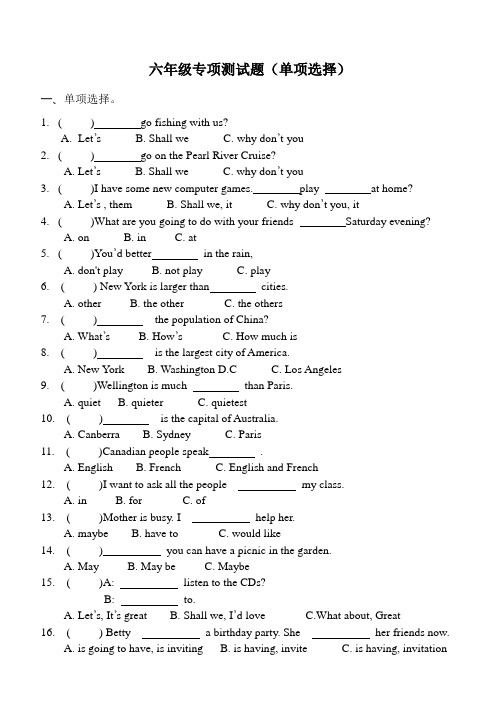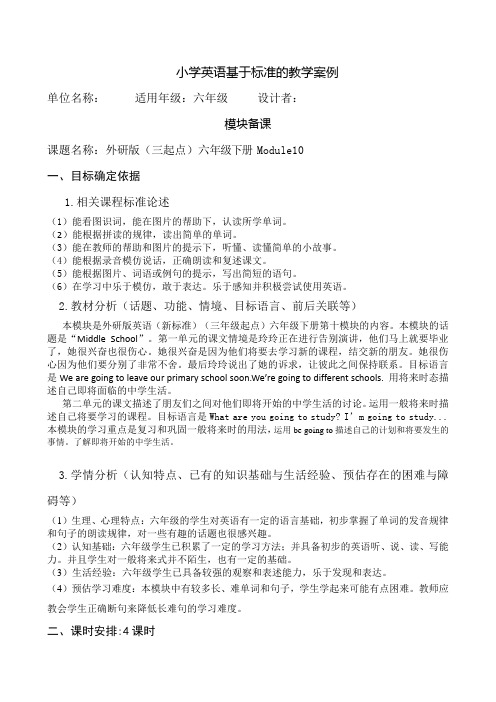we are going to school soon 语法
- 格式:docx
- 大小:11.15 KB
- 文档页数:1

小学英语语法专题训练:一般将来时一、单选题(共35题;共70分)1.—What is Chen Jie going to do next weekend?—She is going to __________Me.A. visitB. visitingC. visits2.I stopped playing with the doll ______.A. tomorrowB. next dayC. a long time ago3.I think he will write to you_______.A. yesterdayB. soonC. last week4.I'm going to ___________ him English.A. teachsB. teachesC. teach5.My family _____________ going to the park this Sunday.A. isB. areC. will6.I don't know. ask.A. IB. I'llC. I'm7.I'm going to _______________ my homework.A. doB. doesC. didD. doing8.It will _______________ in Harbin.A. snowyB. snowsC. snowingD. snow9.It's going _________________ soon.A. rainB. to rainC. rainingD. to rains10._______________ are you going ________________ summer?A. Where; lastB. Where; nextC. What; lastD. What; next11.I will __________the beach this summer.A. goB. go toC. went to12.— _________________ be hot?— Yes, _________________.A. Will; is itB. Will it; it willC. Will; it won'tD. Will it; it is13.I'm going______________ an email to Mum.A. to sendB. sendC. to sendingD. sending14.We are going to __________________ basketball tomorrow.A. playB. playedC. plays15.She is going to English.A. studyB. studyingC. studied16.I ______go to Hong Kong with my family tomorrow.A. amB. willC. am going17.Wang Bing is going to ______some fruit.A. bringB. bringsC. brought18.She is going to _____ in the river.A. swimB. swamC. swimsD. swimming19.We're going to ______________ a baseball game.A. haveB. hadC. has20.It will in Sanya.A. warmB. sunC. be warm21.The seeds are bad and will never ____________________.A. sproutsB. sproutingC. sprout22.I'm going to________art lesson.A. having aB. have anC. have a23.—When are you going to Beijing?—.A. Last weekendB. This weekendC. Yesterday24.One day I _______ visit the moon.A. amB. /C. am going to25.It will ___________ in Xi'an tomorrow.A. windyB. be windyC. be snow26.We're going to __________Chinese.A. speakingB. speakC. speaksD. making27.There _________________ a strong wind along the sea the day after tomorrow.A. isB. areC. will be28.What John do with you this afternoon?A. isB. doesC. will29.We are going to ______________ our primary school.A. leaveB. leavesC. leaving30.I'll _______ it forever.A. keepB. keepsC. kept31.I will _____________ you.A. missingB. missesC. miss32.We _______ have a baseball team.A. be going toB. are going toC. is going to33.It is going to be _________.A. sunB. sunnyC. snow34.We _______ have a picnic this Sunday.A. am going toB. is going toC. are going to35.Look! It's going to __________ soon.A. rainyB. rainC. raining二、选词填空(词汇运用)(共4题;共4分)36.Someday she will________ (visit/visits) America with her family.37.It will ________ (snow/ snowy) in Beijing.38.We ________ (are going to have/ have) a farewell party next Saturday afternoon.39.She will ________ (meet/ meeting) her friends in the park.三、语法填空(共11题;共11分)40.They________ (visit) their grandparents next weekend.41.I am________ (go) to the park.42.What will you ________ (do) tomorrow?43.He will ________(is) a farmer.44.I will________(remember) you forever.45.We________(buy) some delicious food tomorrow. What about you?46.They ________(come)to the airport to meet their friend, Tom next Monday.47.Nancy________ (take) part in a sports meeting next week.48.Kitty is arriving on Sunday, the ________ (five) of January.49.Dong Hao ________ (write) letters to his friends tomorrow.50.We're going to________some pictures in Renmin Park(draw).答案解析部分一、单选题1.【答案】A【考点】一般将来时,动词原形【解析】【分析】句意:—陈杰下周末打算做什么?—她打算来……我。

六年级专项测试题(单项选择)一、单项选择。
1.( ) go fishing with us?A.Let’sB. Shall weC. why don’t you2.( ) go on the Pearl River Cruise?A. Let’sB. Shall weC. why don’t you3.( )I have some new computer games. play at home?A. Let’s , themB. Shall we, itC. why don’t you, it4.( )What are you going to do with your friends Saturday evening?A. onB. inC. at5.( )You’d better in the rain,A. don't playB. not playC. play6. ( ) New York is larger than cities.A. otherB. the otherC. the others7. ( ) the population of China?A. What’sB. How’sC. How much is8. ( ) is the largest city of America.A. New YorkB. Washington D.CC. Los Angeles9. ( )Wellington is much than Paris.A. quietB. quieterC. quietest10. ( ) is the capital of Australia.A. CanberraB. SydneyC. Paris11. ( )Canadian people speak .A. EnglishB. FrenchC. English and French12. ( )I want to ask all the people my class.A. inB. forC. of13. ( )Mother is busy. I help her.A. maybeB. have toC. would like14. ( ) you can have a picnic in the garden.A. MayB. May beC. Maybe15. ( )A: listen to the CDs?B: to.A. Let’s, It’s greatB. Shall we, I’d loveC.What about, Great16. ( ) Betty a birthday party. She her friends now.A. is going to have, is invitingB. is having, inviteC. is having, invitation17. ( )The new teacher does not know all the names.A. studentB. studentsC. student’sD. students’18. ( )What clothes does she wearing?A. likeB. likesC. would likeD. liking19. ( ) we go for a walk?A. Let’sB. ShallC. LetD. Would20. ( )There to be a basketball game tomorrow.A. areB. isC. is goingD. are going21. ( )I am sorry I come.A. cann’tB. can’tC. may notD. can22. ( )Jack and Jim are swimming.A. goodB. likeC. good withD. good at23. ( )There is river behind our house.We often go out for a walk near river.A. a,aB. the, theC. a, theD. the, a24. ( )They are having time in the park.A. goodB. the bestC. a goodD. nice25. ( )Our school isn’t far here.A. toB. fromC. forD. near26. ( )Look at these clouds. It soon , I am afraid.A. is rainingB. is going to rainC.rainD. rains27. ( )Jack his coat. He is going to play in the park.A. put onB. putting onC. puts onD. wears28. ( ) we meet them at the school gate?A. WouldB. MayC. CanD. Shall29. ( )There are many books on the desk. Which book does Lucy like ?A.muchB. betterC.bestD.more30. ( ) would like to work with us.A.All theyB. All of themC. All of theyD. All them31. ( ) Many children would like their parents with them atweekends.A. stayB. stayingC. to stayD. stays32. ( )What is Li Lei going to do ?A. next weekB. last weekC. the weekD. a week33. ( )They are going school soon.A. to leaveB. leavingC. leavesD. left34. ( )Would you like cakes, please?A. someB. anyC. otherD. others35. ( )Thank you for .A. helpB. helpsC. your helpD.to help36. ( )I am afraid I have idea.A. not someB. noC. no anyD.not37. ( )I am thinkng about .A. what to sayB. what sayC. say whatD.say to what38. ( )We can see sun from here.A.aB. anC. theD./39. ( ) Jack isn’t listening. He out of the window.A.looksB. is lookingC. is watchingD.watch40. ( ) Lucy’s mother is making a big birthday cake.A. himB. herC. themD.his41. ( )Mr Wu usually leaves home school very early.A.for, toB. /, forC. to, toD./, to42. ( )The box is of all.A. the biggestB. heaviestC. the bigestD.the heavier43. ( ) I’m than my little sister.A. youngB. oldC. youngerD.older44. ( )Everyone there English very well.A. speaksB. tellsC. talksD.says45. ( )He is going apples on a farm.A. to pickB. pickC. pickingD.picks46. ( )How do you see in the house?A. much peopleB. much peoplesC. many peopleD.many peoples47. ( )Look at the picture page 32.A. atB. inC. toD.on48. ( )Li Mei is good at .A.singB. singingC. to singD.sings49. ( )What going to the park?A. aboutB. timeC. areD.is50. ( )The elephant is than any other animal on land.A. biggerB. biggestC. bigerD.bigest51. ( )We shall go to the zoo and the animals.A.have a lookB. have look atC. a have lookD.have a look at52. ( )Are there on the table?A.six small bag of teaB. small six bags of teaC. six small bags of teaD. six small tea bags53. ( ) Jack his coat. He is going to play in the park.A. put onB. putting onC. puts onD.wears54. ( )There a football game tomorrow morning.A. are to beB. is to beC.is going to beD.is going to have55. ( )Which coat do you like , the black one or the blue one?A. betterB. bestC. the bestD.the better56. ( ) “ Monkeys are better than pandas.””No, “A. I don’t think soB. I think it doesn’tC. It is rightD.I think it is right.57. ( )How can I get to the station?Go the road and take the second turning the right.A. to, atB. down, onC. to, onD.down ,at58. ( )Unit 8 is harder than Unit 7.A. muchB. moreC. veryD.quite。

2023年小升初语法总复习(四)一般将来时一、一般将来时的定义:表示将要发生的动作或存在的状态及打算、计划或准备做事情。
句中一般含有以下时间状语:tomorrow, next day(week, month, year...), soon, the day after tomorrow等。
二、一般将来时的句型结构:1.肯定句:(1)will+do,如:We will go shopping tomorrow.我们明天将去购物。
(1)be going to+do,如:I am going to shop tomorrow.我明天将去购物。
2.否定句:在be动词(am, is, are)后加not或情态动词will后加not,也可所写成won’t。
如:I am going to shop tomorrow.-I am not going to shop tomorrow.I will go shopping tomorrow.-I will not go shopping tomorrow.3.一般疑问句:be动词或will提到句首,some改成any,and改为or,第一、二人称互换。
如:I am going to shop tomorrow.-Are you going to shop tomorrow?I will go shopping tomorrow.-Will you go shopping tomorrow?4.特殊疑问句:特殊疑问词+一般疑问句?一般将来时中对画线部分提问有三种情况:(1)问人:Who如:I am going to school.(对画线部分提问)Who’s going to school?(2)问干什么:What...do如:My father is going to watch a race with me this afternoon.(对画线部分提问)What is your father going to do with you this afternoon?(3)问什么时候:When如:Yang Ling is going to play football tomorrow .(对画线部分提问)When is Yang Ling going to play football?【即时演练】一、用所给动词的适当形式填空。

高中语法过去将来时用法初一英语语法过去将来时练习篇一初一英语语法过去将来时练习过去将来时一、概念:立足于过去其中一时刻,从过去看将来,常用于宾语从句中。
二、常搭配的时间状语:the next day(morning, year),the followingmonth(week),etc.三、基本结构:①was/were going to + do;②would/should + do; ③was/were to was/were about to+do否定形式:①was/were/not + going to + do;②would/should + not + do.一般疑问句:①was或were放于句首;②would/should 提到句首。
例句:I knew you would agree. 我知道你会同意的。
I said I would arrange everything. 我说我来安排一切。
四、基本用法表示过去的时以后将要发生的动作。
但这个“将来”时间绝不会延伸到“现在”;而仅限于“过去时间区域内”。
由此可以看出,含这个时态的句子常带一个表示“过去一些时间点”的状语。
这个状语或是一个短语,或是一个句子。
这个时态常用于:A)宾语从句或间接引语中;B)表示过去习惯性的动作;C)表示过去情况中的“愿望”、“倾向”,多用于否定句。
例如:A) When I thought about it , I wondered what their reaction would be . 当我考虑这件事时,我想知道他们的反应是什么。
She told me that she would go on trip to Europe the next day. 她告诉我,她第二天要去欧洲旅行。
He didn't expect that we would all be there. 他没料到我们会全在那儿。

小学英语基于标准的教学案例单位名称:适用年级:六年级设计者:模块备课课题名称:外研版(三起点)六年级下册 Module10一、目标确定依据1.相关课程标准论述(1)能看图识词,能在图片的帮助下,认读所学单词。
(2)能根据拼读的规律,读出简单的单词。
(3)能在教师的帮助和图片的提示下,听懂、读懂简单的小故事。
(4)能根据录音模仿说话,正确朗读和复述课文。
(5)能根据图片、词语或例句的提示,写出简短的语句。
(6)在学习中乐于模仿,敢于表达。
乐于感知并积极尝试使用英语。
2.教材分析(话题、功能、情境、目标语言、前后关联等)本模块是外研版英语(新标准)(三年级起点)六年级下册第十模块的内容。
本模块的话题是“Middle School”。
第一单元的课文情境是玲玲正在进行告别演讲,他们马上就要毕业了,她很兴奋也很伤心。
她很兴奋是因为他们将要去学习新的课程,结交新的朋友。
她很伤心因为他们要分别了非常不舍。
最后玲玲说出了她的诉求,让彼此之间保持联系。
目标语言是We are going to leave our primary school soon.W e’re goi ng to different schools. 用将来时态描述自己即将面临的中学生活。
第二单元的课文描述了朋友们之间对他们即将开始的中学生活的讨论。
运用一般将来时描述自己将要学习的课程。
目标语言是What are you going to study? I’m going to study... 本模块的学习重点是复习和巩固一般将来时的用法,运用be going to描述自己的计划和将要发生的事情。
了解即将开始的中学生活。
3.学情分析(认知特点、已有的知识基础与生活经验、预估存在的困难与障碍等)(1)生理、心理特点:六年级的学生对英语有一定的语言基础,初步掌握了单词的发音规律和句子的朗读规律,对一些有趣的话题也很感兴趣。
(2)认知基础:六年级学生已积累了一定的学习方法;并具备初步的英语听、说、读、写能力。

语法知识:be going to do sthbe going to句型的两种不同用法I’m going to the school.我正要去学校。
I’m going to go to the school.我打算去学校。
第一句是动词go的进行时表将来,(to)之后须加名词。
(come, go等趋向动词的现在进行时表将来。
)第二句则为be going to的一般将来时句型,to之后须加动词原形。
一般将来时一、概念:表示将要发生的动作或存在的状态及打算、计划或准备做某事。
句中一般有以下时间状语:tomorrow, next day(week, month, year…),soon, the day after tomorrow(后天)等。
二、基本结构:①be going to + do;②will+ do.be going to的特殊疑问句形式构成方式:疑问词+be going to的一般疑问句。
一个口诀献给大家: 疑问词在句首, 系动词be跟着走, 主语、going紧相随, 其它成分不要丢。
如何把陈述句形式转换成特殊疑问句形式呢?一个方法,那就是:一定、二变、三去掉。
一定:即确定划线部分的疑问词; 二变:即把be going to变为一般疑问句形式; 三去掉:去掉划 线部分。
例如: We are going to have a meeting next Monday. A:确定疑问词为when(什么时候) B:把原句改为一般疑问句are you going to have a meeting next Monday? C:去掉划线部分,即When are you going to have a meeting?你们打算什么时候开会? 【注意】如果对to后面的动词短语进行提问则要用What...do...?对例句中的have a meeting进行提问应为: What are you going to do next Monday? 下星期一你们打算做什么? 【特别警示】当划线部分为主语或主语的定语时,特殊疑问句的语序为陈述句语序。
一般将来时态知识点详解(初中英语专项复习)知识点01 一般将来时主要构成形式【语法详解】一般将来时表示将来某个时间要发生的动作,事情或存在的状态,也表示将来经常或反复发生的动作或事情。
肯定句:1、主语+will/shall+动词原形。
2、主语+am/is/are+going+to+动词原形。
3、主语+am/is/are+to+动词原形。
4、主语+am/is/are+现在分词。
5、主语+am/is/are+going to+动词原形。
标志词:tomorrow, next day(week, month, year…),soon, in a few minutes, by…,the day after tomorrow。
详细用法:1. will/shall+动词原形,shall用于第一人称,常被will 所代替。
will在陈述句中用于各人称,在征求意见时常用于第二人称,will not=won’t,shall not=shan’t。
Which paragraph shall I read first? 我先读哪一段呢?Will you be at home at seven this evening? 今晚七点回家好吗?2. be going to +不定式,表示将来。
a. 主语的意图,即将做某事。
What are you going to do tomorrow? 明天打算作什么呢?b. 计划、安排要发生的事。
The play is going to be produced next month这出戏下月开播。
c. 有迹象要发生的事。
Look at the dark clouds, there is going to be a storm. 看那乌云,暴风雨快来了。
3. be +不定式表将来,按计划或正式安排将发生的事。
We are to discuss the report next Saturday. 我们下星期六讨论这份报告。
Be going to的用法与练习正文:XXX 句型的用法Be going to 句型有两种不同的用法。
第一种用法是表示将要发生的动作或存在的状态,例如:I’m going to the school。
我正要去学校。
在这种情况下,to 后面需要加上名词。
第二种用法是表示打算、计划或准备做某事,例如:I’m going to go to the school。
我打算去学校。
在这种情况下,to 后面需要加上动词原形。
一般将来时一般将来时用于表示将要发生的动作或存在的状态,以及打算、计划或准备做某事。
句中通常会有时间状语,如:tomorrow。
next day(week。
month。
year…)。
soon。
the day after tomorrow(后天)等。
它有两种基本结构:①be going to + do;②will + do。
Be going to 的特殊疑问句形式构成特殊疑问句的方式是:疑问词 + be going to 的一般疑问句。
可以用以下口诀来记忆:疑问词在句首,系动词 be 跟着走,主语、going 紧相随,其它成分不要丢。
要把陈述句形式转换成特殊疑问句形式,可以采用一定、二变、三去掉的方法。
即:确定疑问词,把 be going to 变为一般疑问句形式,去掉划线部分。
例如:We are going to have a XXX。
确定疑问词为 when(什么时候),把原句改为一般疑问句 are you goingto have a meeting next Monday。
然后去掉划线部分,即 When are you going to have a meeting。
你们打算什么时候开会?需要注意的是,如果要对 to 后面的动词短语进行提问,则需要使用 What。
do。
对于例句中的 have a meeting 进行提问,应该是:What are you going to do next Monday。